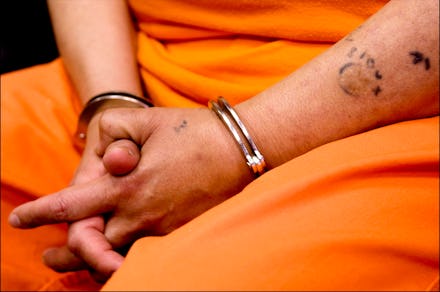The Horrifying Women's Rights Injustice That Modern Feminism Forgot

Recent legislation regarding the forced sterilizations performed on incarcerated women in California prisons evokes a muted time in U.S. history when sexist, racist, classist and ableist eugenics policies were orchestrated by the state.
But while the scandal evokes skeletons of days past, the problem is far from dead and buried. Today, state oversight is the perpetrator, as the 39 female inmates who were sterilized from 2005 to 2013 without meeting state requirements for consent exemplify. Despite these nuances, however, forced sterilization looks a lot like it did under the United States' early Supreme Court-backed eugenic laws: brushed off and racialized.
Such an infuriating issue should attract the ire of the feminist community, but so far there are mostly crickets. This unresponsiveness echoes the attention women's rights and reproductive justice groups have historically given to forced sterilization, a procedure that overwhelmingly plagues women of color and, in California, has disproportionately affected prisoners of color. According to the California State Auditors report, more than 90 of the 144 California inmates sterilized are women of color, with 53 identifying as Latina, 35 as black and six as "other."
Since the Supreme Court's ruling on buffer zones and Hobby Lobby, the blogosphere has been awash with countless articles on abortion. But while a women's right to choose deserves headlines, so, too, does the callous stealing of that right. The issue of forced sterilization and the reproductive rights violations against California female inmates were essentially nonexistent on "mainstream" feminist sites like Jezebel, xoJane and Bustle.
As Salamishah Tillet wrote in 2013 following the Center for Investigative Reporting's discovery that 144 California female inmates had been sterilized, "We are stuck in a hierarchy of traditional reproductive rights activism, which has historically placed abortion as its primary concern, and other issues, like forced sterilization, far below."
In fact, since the mid-20th century, an untold number of Latina, black and Native American women have been sterilized without their informed consent. These racially charged, gender-based violations were supported by some feminist "heroines" like Margaret Sanger. Sanger, who advanced her birth control campaign by forming alliances with worldwide eugenic and neo-Malthusianism movements, had direct involvement in the U.S.' eugenics movement.
Image Credit: La Operación
Women in Puerto Rico, one of the first targets of the U.S.' Sanger-backed eugenics policies, can attest to this.
Though politicians, researchers, philanthropists and pharmaceutical companies maintained that birth control in Puerto Rico, including sterilization and subsequent unethical clinical trials, were public health measures aimed at mending the "problem" of overpopulation and poverty on the island, María García's 1982 documentary La Operación introduces audiences to Puerto Rican women who tell a more troubling narrative.
"I thought they did something to me that afterwards, if I wanted, I could undo. I didn't know what was happening to me," said a woman, in Spanish, in La Operación. "After they operated on me, two days later, a doctor came to visit. He put his records on my bed. When he left, I looked at it, and it said that they had cut and sewn me with a black thread. And I was thinking, 'Oh Lord. What did they cut?'"
By the 1960s and '70s, when the government made sterilization available for free or for a nominal fee, it became easier to coerce women into accepting sterilizations. Perhaps this is why, in 1970, 40 years after the U.S. instituted sterilization policies on the island, one-third of Puerto Rican women had received la operación, leaving more than 35 percent of Puerto Rican women unable to reproduce.
Image Credit: Southern Studies
By this time, countless numbers of impoverished, mentally ill and women of color often regarded as "undesirables," living in the mainland U.S. were also being sterilized. According to NBC News, by the 1960s, tens of thousands of women in the U.S. were sterilized in state-run eugenics programs.
In North Carolina's 45-year stretch of forced and coerced sterilization, 7,600 people, disproportionately black, female and almost entirely poor, were sterilized. Virginia's eugenics program was also among the most aggressive in the nation, with numbers matching North Carolina. But, of the 32 states intending to enhance the race by ridding the country of "inferior genetic stock," California had the highest number of sterilizations. In total, 20,108 "undesirables," including Mexican and black men and women, were sterilized in the Golden State by 1964.
It was also in California where a young Native American woman walked into a doctor's office asking for a womb transplant. At this moment, in 1972, she learned that the Indian Health Service provider, an operating division within the U.S. Department of Health and Human Services, who told her the hysterectomy he performed was reversible had lied. Tragically, her story is not unique. By 1976, 25 percent of Native American women had been sterilized without their informed consent.
In recent years, California, Virginia, Oregon and other states with dark pasts have apologized for their former sterilization policies, but only North Carolina has attempted to right its wrongs by budgeting $10 million for the victims of its eugenics program. While an estimated 1,800 victims are still alive, only 520 have filed claims since June 24. The deadline was June 30.
Wondering why nationally recognized feminists and reproductive rights groups haven't been spreading this massive, timely reproductive justice news? Me, too. But it might be the same reason so few of them have covered the illegal sterilization of California prison inmates.